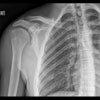Yearly mammography in women in their 40s with a medium familial risk of breast cancer can reduce the mortality rate by almost 30%, according to new research published online November 18 in Lancet.
The findings add more fuel to the heated clinical debate over whether screening mammography is really effective -- or necessary -- for women in the 40 to 50 age range.
Stephen Duffy, a professor of cancer screening at Barts and the London School of Medicine and Dentistry at Queen Mary, University of London, led a research team that conducted the Family History 01 (FH01) study exploring whether screening affects the disease stage and projected mortality of women younger than 50 who have a clinically significant family history of breast cancer.
The study included women from 76 centers across 34 cancer research networks in the U.K. who were enrolled between January 2003 and February 2007. It comprised a total of 6,710 women between the ages of 40 and 44 who received yearly mammography for a mean of four years up until November 2009.
Women with intermediate familial breast cancer risk were compared to a control group of participants from the U.K. Age Trial (106,971 women ages 40 to 42 years at recruitment and followed for 10 years) and a Dutch study of women between the ages of 25 and 77 with a family history of breast cancer diagnosed between 1980 and 2004.
Of the population, 136 women in the FH01 study were found to have breast cancer; 105 of these were diagnosed at screening, 28 were diagnosed due to symptoms in the screening interval, and three were diagnosed due to symptoms after failing to have their latest mammogram.
The study found a definite survival benefit to mammography screening: Women in the FH01 study had a predicted average 10-year survival of 81%, compared to 73% in the control group of the U.K. Age Trial and 71% in the Dutch study. The overall relative risk of patients in the FH01 study was 0.80 (95% confidence interval: 0.66-0.96).
After adjusting for underlying risk, the predicted 10-year mortality rate in the FH01 trial was up to 10%, compared to the control group from the U.K. Age Trial, which had a predicted 10-year mortality rate of up to 38%.
"Our data suggest that in women younger than 50 years who are at medium or greater familial risk of breast cancer, mammographic surveillance could increase cancer detection, reduce the risk of advanced stage disease, and decrease predicted mortality," the authors concluded.
By Kate Madden Yee
AuntMinnie.com staff writer
November 19, 2010
Related Reading
More frequent follow-up helps breast conservation patients, May 5, 2010
Breast MRI improves cancer staging for newly diagnosed women, May 3, 2010
Radiation exposure increases risk of breast cancer, March 4, 2010
DCIS recurrence rates higher in younger women, October 7, 2009
Women treated for DCIS are not obtaining regular surveillance mammograms, May 26, 2009
Copyright © 2010 AuntMinnie.com



















